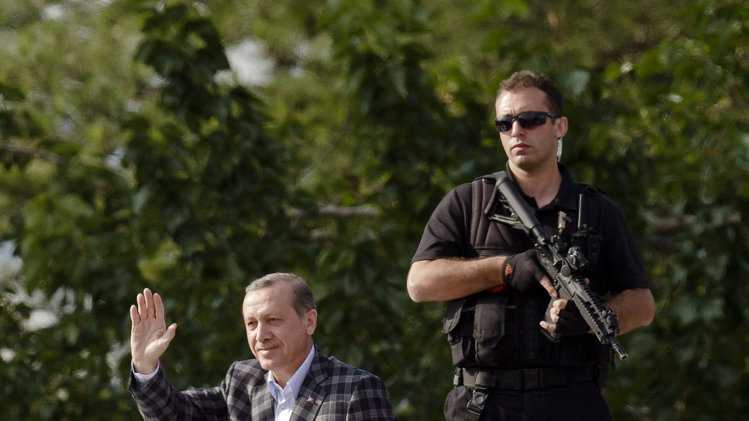
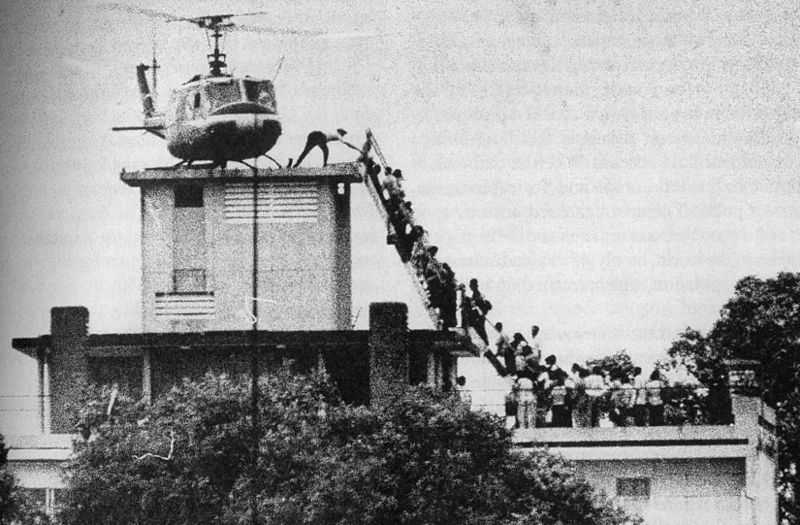
The Fall of Saigon, 29 April 1975.
Evacuation of CIA station personnel from roof of US embassy.
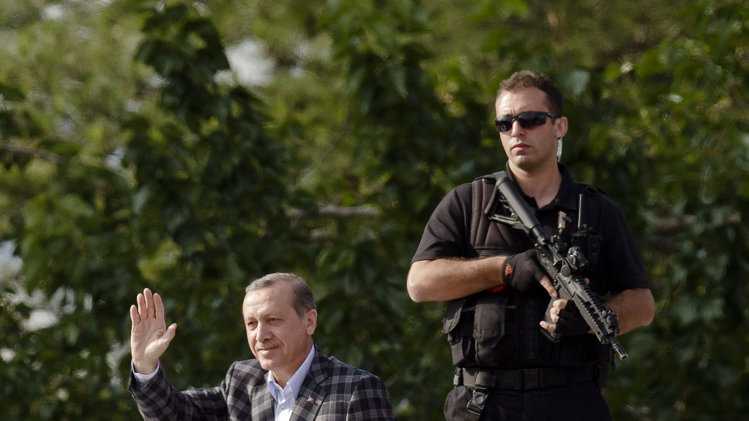


The Fall of Saigon, 29 April 1975.
Evacuation of CIA station personnel from roof of US embassy.

The Republics of Armenia and Turkey have been in a long-lasting conflict with no resolution in sight. Therefore a proper assessment of the political system and state ideology of Turkey is extremely important for the Armenian state to build a competent foreign policy and properly position itself in the international arena.
The West has traditionally portrayed the Republic of Turkey which emerged on the ruins of the Ottoman Empire as a secular democratic Muslim state. Even though this cliche is being persistently circulated in the Western media and very often uttered by American and European officials, it is far from reality. Unfortunately, Armenia has not yet dared to offer its own assessment of modern Turkish statehood and tacitly put up with the aforementioned international narrative.
In reality, one of the consequences of the Armenian Genocide was the creation of the first fascist state in Europe’s periphery. The Republic of Turkey had all the core characteristics inherent to fascism and Nazism, which later emerged in Italy, Germany and some other European countries. Below the six main characteristics of Turkish fascism are identified:
1. Turkish chauvinism and genocidal policies. Mustafa Kemal (Ataturk) was formerly himself a member of the governing body of Committee of Union and Progress (CUP), the political organization of murderous Young Turks. Once in power, Ataturk and the Kemalists not only continued the Armenian Genocide, but directed their tested policies of extermination of an entire people against Greeks and other ethnic minorities. In Eastern Armenia alone, the Kemalists destroyed 200,000 Armenians (1920-1921), in Smyrna – 100,000 Greeks and Armenians (September 1922), in the Black Sea regions – about 300,000 Pontian Greeks (1919-1923). They also continued the Genocide against the Assyrians, of whom about 500,000 were annihilated by the Turkish forces from 1915 to 1923. Deportations, mass exterminations, political and cultural repressions against the Kurds, the second largest ethnic group in modern Turkey, began immediately after the Armenian Genocide and continue to this day. All Kurdish attempts to protect their basic national and human rights were brutally suppressed in 1925, 1927, and 1937. In 1980s and 1990s, more than a million Kurds were deported to large cities (during these deportations, according to various estimates, two to three thousand Kurdish villages were destroyed).
Turkish chauvinism was legislatively approved in the Constitution of 1937 under the auspicious name of “nationalism” (Milliyetçilik ), openly aiming to assimilate non-Turkic ethnic groups and legally identifying them as Turks. Although later the concept of Turkish “nationalism” was interpreted in different ways, its chauvinistic nature and essence has remained unchanged.
The modern discipline of Holocaust and Genocide Studies identifies the denial of genocide as an extension of genocidal policies. Gregory Stanton, former President of the International Association of Genocide Scholars, emphasizes that “Denial is the final stage of genocide. It is a continuing attempt to destroy the victim group psychologically and culturally, to deny its members even the memory of the murders of their relatives. That is what the Turkish government today is doing to Armenians around the world.” Elie Wiesel, the famous Holocaust survivor and political activist, has repeatedly called Turkey’s 90-year-old campaign to cover up the Armenian genocide a double killing, since it strives to kill the memory of the original atrocities. The Armenian government should have assessed Turkish denialism in similar and even graver terms, but to this date it has failed to do so for no apparent reason.
In contemporary democratic Germany it is simply impossible to imagine a street or institution named in honor of any of the leaders of the Third Reich – indeed it is legally prohibited! Meanwhile, in “democratic” Turkey the leaders of CUP, i.e. the criminal organizers and perpetrators of the Armenian Genocide, are openly glorified. For example, a district in Istanbul, a few avenues and streets in different parts of Istanbul, boulevards in Ankara and Edirne, primary schools in Istanbul, Ankara and Izmir, and a high school in Konya are all named after Talat Pasha, Minister of the Interior and (in 1917-1918) Grand Vizier of the Ottoman Empire, who personally orchestrated the Armenian Genocide.
“Democratic” Turkey also actively uses the infamous Article 301 of its Criminal Code (“insulting Turkishness”, in 2008 changed to “insulting the Turkish nation”). This law, among other things, makes the recognition of the Armenian Genocide a crime. About 50 trials have already been held based on this article.
2. Totalitarianism. Up to the late 1940s Turkey was a one-party state. However, even today “democratic” Turkey periodically imposes a ban on one political party or another (even those elected to parliament), while its leaders are thrown in jail on trumped-up political charges. The last of a series of such cases occurred in December 2009, when the Turkish Constitutional Court banned the pro-Kurdish Democratic Society Party (DTP), which had 21 MPs. All the property of DTP was confiscated by the state. This even prompted the European Union, which by and large turns a blind eye to the racist repressions against 20 million Kurds in Turkey, to remind Ankara that “the dissolution of political parties is an exceptional measure that should be used with utmost restraint.”
Turkey’s state propaganda, all-inclusive revision and falsification of the Ottoman and modern Turkish history through carefully controlled scholarship, school curricula, and legally enforced taboos, including severe restraints on free access to information and freedom of expression, resulted in effective brainwashing of its own population.
3. Statism (etatism). The Turkish Constitution of 1937 strengthened the regulatory role of the state not only in the economy, but also in ideology.
4. Anti-communism. Ataturk, despite his friendship with the Soviet Union, was a staunch anti-communist. The Communist Party of Turkey has been banned since 1923 and remained illegal throughout its whole history, having been routinely subjected to most brutal state repressions.
5. Leaderism and the cult of personality. In Turkey, the cult of Ataturk is still in full bloom. Statues and monuments of Ataturk are installed in every city, his portraits are hung in all government and administrative institutions, as well as in school classrooms, and his portraits are on banknotes and coins of all denominations. Criticism of his life activities and biography are criminalized and carrying Ataturk as one’s last name is banned.
6. Militarism and aggression. Turkey is one of the most militarized countries on earth, with the eighth-largest army in the world and second only to the United States in NATO. The decisive sway of the Turkish military on domestic politics is well known: one only needs to recall the three coups d’état carried out by the Turkish army in 1960, 1971 and 1980, as well as the harsh ousting of Islamist Prime Minister N. Erbakan from power in 1997 (incidentally, his ruling “Welfare Party” was also banned).
The Republic of Turkey has repeatedly resorted to military force or threat of force against neighboring countries, such as Syria, Cyprus, Iraq, Greece, and Armenia. The Northern part of Cyprus, Syria’s district of Alexandretta, and the western part of Armenia still remain occupied. The Turkish army also regularly invades Northern Iraq.
In 1920, the first Republic of Armenia fell under the blows of Kemalists. Indeed, the direct order that Karabekir-Pasha received from Mustafa Kemal literally specified “to destroy Armenia morally and physically.” Immediately after the collapse of the Soviet Union, Turkey’s policy towards the “third” Republic of Armenia became explicitly aggressive in nature once again, including an ongoing land-blockade, refusal to establish diplomatic relations, enduring Armenian Genocide denial, support and assistance to Azerbaijan in its preparations for a new military venture against Armenia, etc.
The emergence and subsequent superstructural metamorphosis of fascism in Turkey was not adequately evaluated by Soviet/Russian or Western historiographies and neither was it reflected in international legal and political documents. However, this should not lead anyone astray. Generally, Turkophilia in political and academic circles in both the West and USSR/Russia, is a quite multi-faceted phenomenon and a separate topic for discussion. Here an incomplete explanation will suffice: the USSR was simply unable to call Ataturk a fascist, because “the leader of the world proletariat” Vladimir Lenin and Ataturk signed the infamous Moscow Treaty of “Friendship and Brotherhood” on March 16, 1921 (incidentally, exactly 90 years ago). Meanwhile, the West avoided such an unfavorable evaluation, because Turkey has historically been considered – and actually was – a barrier against Russia/Soviet Union, and a key strategic ally. Turkey’s alliance with the West was legally formalized by its accession to NATO in 1952.
If the international community (alias “the great powers”) does not adequately characterize the fascist essence of the modern Turkish state, this is simply because it has not been interested in such an exposé. But independent Armenia, by failing to officially identify and denounce the fascist nature of Turkish state, not only refuses to clearly see and understand the true ideology, strategic goals and calculations of its age-old archenemy, but also deprives itself of the chance to present properly its own dire geostrategic situation to the world. After all, Armenia’s present security predicaments are a direct result of crimes by Turkish fascism!
Attempts to rehabilitate Turkey without having it incur its due responsibility – in particular, without the territorial restitutions and other compensations to Armenia – can lead to new and repeated genocides. This is the main conclusion that the international community has yet to draw.
ARMEN AYVAZYAN
Doctor of Political Sciences
“Hayastani Zrucakic”, N: 10 (173 ), 18 March, 2011
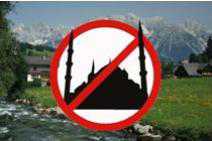
 By Liz Fekete
By Liz FeketeLIZ Fekete: You are in London, at the invitation of the Architecture Foundation, to speak at a forum on architecture’s political and social role in the context of the Swiss ban on minarets and the hysteria in the US over plans to site a new Islamic cultural centre in downtown New York City.[2] First, could you tell us a little bit about FAS?
Charlotte: We are a collective of architects from different backgrounds living in Switzerland fed up with the general passivity within the architecture profession who steer away from any controversy or political debate and adopt a low profile. Switzerland is often portrayed as a paradise, but from where we were standing there is a lack of innovation. So the whole purpose of FAS is to provide, often in a playful way, a platform for alternative ideas and projects that would never be considered in the brain-dead, incestuous architectural media of Switzerland. Oh, yes, and we are also friends. The Collective is a way for us to come together – we are only a few individuals and FAS is not our main occupation.
So how did you react when news came through that the Swiss People’s Party (SVP)[3] had been successful in its referendum to prohibit the construction of minarets?
Charlotte: When we heard about the minaret ban we felt very angry. We were angry because it was clearly discriminatory. The whole talk of Islamicisation was just crazy (there are only four mosques with minarets in the whole of Switzerland). And all that the referendum proved was the level of ignorance and fear that exists in Switzerland about a different culture, Islam. But we were also angry as architects. We felt this as an attack on us as architects, on our field. And despite this, the architectural scene was not responding. This also made us very angry. The only opposition came from civil society in the form of demonstrations, as well as a few individual acts, such as that of Guillaume Morand, the owner of a shoe company, who defied the referendum by extending the chimney on the top of his warehouse near Lausanne to give it the shape of a minaret.
Charlotte: We decided that if we were to address the situation we needed to take architecture and turn it into a weapon. We launched a counter- competition – to design an Islamic Centre. And for this competition we adopted the slogan ‘Save the Honor of Architecture, Save the Honour of Switzerland’.
Lorenz: We chose a site which has a traditionally Swiss landscape. It’s a visitor’s centre up on a hill, with lots of churches and a leisure lake. You have to visualise this. In the middle of a residential area, directly adjacent to a Greek Orthodox church, swimming facilities and an active bar scene. It would be impossible to camouflage a mosque on such a site. The counter-competition asked entrants to come up with a design that would, in the words of the competition tender, ‘promote interaction and dialogue in the community’. You also have to understand that the site, the Kronenwiese along the Limmat River was already controversial. Homeless people and a soup-kitchen had been evicted from the area to make way for a new housing development. So the counter-competition was in itself a political statement, asking the profession to re-evaluate its priorities and raising pertinent questions about multiculturalism in Switzerland.
Jesse: We invited architects to submit a design which would not only give Muslims a place to pray and meet, but provide an open meeting point between cultures. The design would include a mosque, a hamam, an Aula, space for lectures, exhibitions and a theatre, multipurpose rooms for men and women, offices, library, coffee shop and restaurant, as well as a public park and playground.
Jesse: Well, in terms of the general public the reaction was small. But the most important thing was that we actually got entries. Architecture if rather non-political and this is one of the reasons we founded FAZ. And we got so many really thoughtful entries which helped us achieve our aim – to catalyse a much needed discussion within the architectural community about cultural differences.
Charlotte: Some of the entrants challenged stylistic norms, others went so far as to suggest that religion, as well as architectural style, is bound to evolve in a changing cultural climate. From these entries we picked out three which addressed different issues of design. The first was very open, the second quite aggressive, challenging codes on mosques and the third rather tongue-in-cheek, with a minaret. And through this we really did achieve our aim to catalyse discussion, which we also did via our facebook page and our fanzine that we sent to about 250 architects, university chairs, architecture organisations and publications in and outside Switzerland.
Jesse: The Muslim community are very under-represented in Swiss society and were very scared. They were placed in a difficult position; they found it difficult to come out. Ours was an act of solidarity.
Charlotte: You have to understand that we are representative of what we are – middle-class architects with a few Muslim friends. I had an intern from Kuwait at that time and she was very shocked by all this. The only way she could understand it was to explain it as some kind of misunderstanding. You find often in discussions people like to minimise the issue, talk about it in rational terms and suggest it must be the result of a misunderstanding.
You clearly feel that architecture has the power to convey positive messages about cultural interaction and it saddened you to see how it was being manipulated.
Jesse: Yes. The architecture of cities are where ideas come together. We tried to get the architecture profession to react, but largely because architects are apolitical, we were disappointed. It seemed to us an obvious thing that you can’t outlaw the mosque, or indeed the right to practice one’s religion. The minaret ban was all about pushing things to their limits. It’s a symbolic thing. And what the minaret ban did was to set forth a symbolic war, one that has been fabricated. It is a fictional narrative. Look at the imagery – minarets are bayonets attacking the land – this is a fictional narrative. They are making use of architecture to make a political statement against Islam. In this way, they conceal their racism. Racism does not have a face. The landscape – architecture – buildings give it a face. And this is precisely why we feel architects had a duty to speak out against the ban. Architecture is a manifestation of social relationships. Architects are responsible for the form of the city, for the urban landscape which organises social relationships. Architects could promote constructive, creative dialogue – if they dare to speak up.
A lot of the original arguments in favour of the ban seemed to rest on the idea of protecting the traditional landscape from foreign cultures. Why was this such a powerful factor in Switzerland?
Jesse: You have to understand that Switzerland is a country where an unusual emphasis is placed on the power of the built environment. This is a country which regulates everything from cast shadows and noise pollution to where you can and can’t hang out your laundry – this is the level to which the Swiss are concerned about their neighbourhoods. It just seems that this is one of the main ways in which xenophobia expresses itself in Switzerland. For me, it seems something very specific to the Swiss. It seems to me that here in the UK xenophobia is much more linked to the fear of terrorism, whereas in Switzerland xenophobia manifests itself around issues of the built environment.
Charlotte: Yes. In Switzerland, the argument is that the landscape is attached to our identity as a nation, and the identity-building aspects of that landscape were depicted as threatened by Islam.
Lorenz: Yes, but the SVP is adept at exploiting any insecurity. They generate a fear of people and they use that fear to gain votes. In fact, at the moment they have issued another referendum to expel foreign nationals who commit crimes.[4] The one thing we all agree on is that the people who are racist and manipulate these fears are not stupid.
But that’s what’s so fascinating about you three. You describe yourself as middle-class people with limited interaction with Muslims. Other people in your social position were falling over themselves to support the ban. Why did you see things differently?
Charlotte: Maybe it’s a question of sensibility. For me I was always uncomfortable with the post 9/11 anti-Muslim drive. I just can’t understand how people don’t link the minaret ban to other forms of discrimination, particularly what happened to the Jews. It freaks me out.
Jesse: I think it comes down to contact and proximity with other people. In our professional life, certainly as architects, we come into contact with people from different cultures all the time. It is the nature of the job that we travel. We have worked in Vienna, in India, all over the place, and we have lived alongside people from the former-Yugoslavia. In many ways I just don’t get it. I can’t understand why people have difficulties with Islamic cultures – after all Islam and Christianity both have Abrahmic roots. I mean the differences are minute.
Charlotte: You must remember, that in the run-up to the minaret ban, people didn’t really mobilise. The opinion polls were all saying that the ban would have no chance. I have many international friends and I wanted to make a sign.
Lorenz: I agree that it’s a question of sensibility – towards fairness, justice. The ones who want to kick people out just don’t see the injustice of it all.
[1] On 29 November 2009, Switzerland became the first country in Europe to vote to curb the religious practices of Muslims when a referendum banning the construction of minarets on mosques was backed by a strong majority. As a result, Article 72 of the Swiss Federal Constitution regulating relations between the state and religion was amended to include the statement: ‘the construction of minarets will be forbidden’. For more information see IRR Briefing Paper No 1, February 2010, ‘The Swiss referendum on minarets: background and aftermath’. [2] Faith in the City: the mosque in the contemporary Urban West was a two-day event organised by the Architecture Foundation in partnership with Openvizor and Arts Council England’s Arts & Islam programme. More information from www.architecturefoundation.org.uk [3] The ‘People’s Initiative Against the Construction of Mosques’ was launched by the SVP and the small ultra-conservative Federal Democratic Union. An SVP poster in favour of the ban depicted a woman wearing a burqa against a background of a Swiss flag upon which several minarets resembling missiles were erected. [4] On 29 November, Swiss voters approved a plan for automatic deportation of foreigners who commit serious crimes or benefit fraud, despite warnings that people who had lived all their life in Switzerland, married Swiss citizens and had children but never obtained Swiss passports, would be unusually hard hit by expulsion. Some 52.9 per cent of voters backed the SVP proposal. 47.1 per cent of voters were opposed. The Institute of Race Relations is precluded from expressing a corporate view: any opinions expressed are therefore those of the authors. RELATED LINKSThe image above, used in FAS’ presentation, was inspired by a video campaignby the Federal Democratic Union (EDU).
The Architecture Foundation
Foreign Architects Switzerland
Arts and Islam
IRR is not responsible for the content of external websites. Inclusion of a link does not constitute an endorsement. Please contact us if you come across a broken link. , 1 December 2010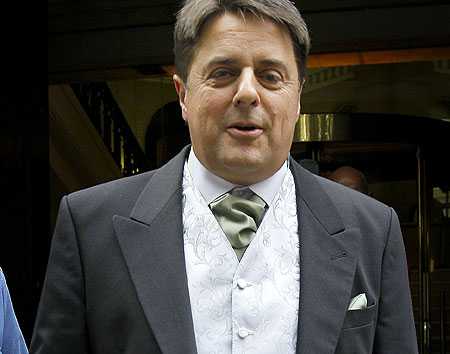

BNP leader Nick Griffin faces being axed as a Euro MP as he fights to avoid bankruptcy over his party’s soaring cash crisis.
He is among top officials thought to be personally liable for the racist group’s £700,000 debts – which it admits it cannot pay.
Anyone made bankrupt is legally barred from being an MP or Euro MP.
The BNP’s money woes were laid bare by ex-chief fundraiser James Dowson in a letter seen by the Mirror.
Mr Dowson told North-East printers who produced its newsletter that the finances were like “a shipwreck”
He added: “Cash is in very short supply… [it is] impossible for the BNP and persons associated with it to pay outstanding bills in anything like a normal timescale, if indeed at all.” The “very grave” crisis meant it could only pay 20% of what it owed, he added.
Its money problems have been made worse by having to settle a legal row after illegally using Marmite in an ad and the cost of fighting the Equality and Human Rights Commission over its whites-only admission rules.
Meanwhile, electoral chiefs are still probing its 2008 accounts as they contain gaps that breach the law.
The BNP’s debt meltdown comes amid a spate of defections and expulsions.
Mr Dowson and media officer Paul Golding have left while campaigns chief Eddy Butler and London Assembly member Richard Barnbrook were recently expelled.
Mr Griffin was not responding to our requests for a comment last night.
, 3/11/2010

Shortly after their demonstration on Sunday outside the Israeli Embassy in Kensington, EDL supporters made their way to Hyde Park where Rabbi Nachum Shifren, the so-called “surfing rabbi” from California, gave a short speech.
The rabbi had earlier called Muslims “dogs” and told the EDL “We will never surrender to the sword of Islam.”
Bryan Kelso, 28, from Luton, Christopher Long, 38, from Roehampton and Brian Bristow, 37, from Doncaster were charged with affray and public order offences.
They appeared today at Westminster Magistrates Court. No pleas were entered and the men were given conditional bail.
, November 3, 2010

 By JAMES KIRCHICK
By JAMES KIRCHICK
Prague
‘The dark night of fascism is always descending in the United States and yet lands only in Europe.” So said Tom Wolfe in 1965, and so it is today.
Various commentators have argued recently that opposition by many Americans to a proposed Islamic center two blocks from the ruins of the World Trade Center represents deep-seated religious bigotry and paranoia. But if any place is plagued by increasing bigotry, it’s not America but Europe, the continent whose welfare states and pacifism are so admired by American liberals.
Last year, nearly 60% of Swiss voted to ban the construction of minarets—all minarets, everywhere, not just near the sites of world-historical terrorist attacks committed by Muslim radicals.
In Belgium, the lower house of parliament passed a burqa ban this year that now awaits Senate approval. In France such a ban became the law of the land last week, having been upheld by the country’s top court. Although there are legitimate reasons for such bans, some support for them certainly arises from anti-Muslim bigotry.
In recent years far-right, anti-immigrant parties have done alarmingly well across Europe. In Sweden, the nationalist Sweden Democrats entered parliament last month for the first time since the party’s founding in 1988. In the United Kingdom, the far-right British National Party won nearly three times as many votes (563,000) in this year’s parliamentary elections as in 2005; last year it won two seats in the European Parliament.
In Austria, the Freedom Party—formerly led by Joerg Haider, who had kind things to say of the Nazis—earned 17.5% of the vote in 2008. In France, the National Front party of Jean-Marie Le Pen, who questioned the existence of the Nazi gas chambers before conceding that they were a “detail” of World War II, came in second in the 2002 presidential election, earning a spot in a runoff with then-President Jacques Chirac.
And now the far right may be rising again in Germany, where stringent speech laws and parliamentary thresholds have long kept it out of the Bundestag. Recent polls cited by the German Press Agency estimate support for an anti-Muslim party at 20%, which would be enough to enter parliament.
“The fall of parliamentary seats into extremist hands represents the biggest shake-up in European politics since the disappearance of communism,” wrote Denis MacShane recently in Newsweek. Mr. MacShane is a Labour member of the British Parliament who previously served as minister of state for Europe.
Europeans are leery not just of Muslim immigrants but of Jews, nearly exterminated on the continent 60 years ago. A recent Pew Global Attitudes poll found that nearly 50% of Spaniards have either a “very” or “somewhat unfavorable” opinion of Jews. The figures are 25% for Germans, 20% for French and 10% for British. This anti- Semitism was underscored by the recent assertion of European Union Trade Commissioner Karel De Gucht that “it is not easy to have, even with moderate Jews, a rational discussion about what is actually happening in the Middle East.”
So when American liberals decry their conservative counterparts as bigots seeking to impose fascism on the U.S. (having failed to do so during two terms of the Bush administration), they ignore that part of the West where genuine nostalgia for fascism endures.
Anyone who has traveled throughout Europe knows that its image as an exemplar of progressivism, and ethnic and religious diversity, is a fabrication of the American liberal mind.
American liberals who ignore European bigotry while considering opposition to the Ground Zero mosque inexcusable bring to mind the mocking suggestion of German communist playwright Bertolt Brecht: “Would it not be easier in that case for the government to dissolve the people and elect another?”
Throughout the mosque debate, the vast majority of Americans showed themselves to be capable of respectful disagreement. It is Europeans, again, whose darker impulses we have to fear.
Mr. Kirchick is writer at large with Radio Free Europe/Radio Liberty based in Prague, and a contributing editor of the New Republic.